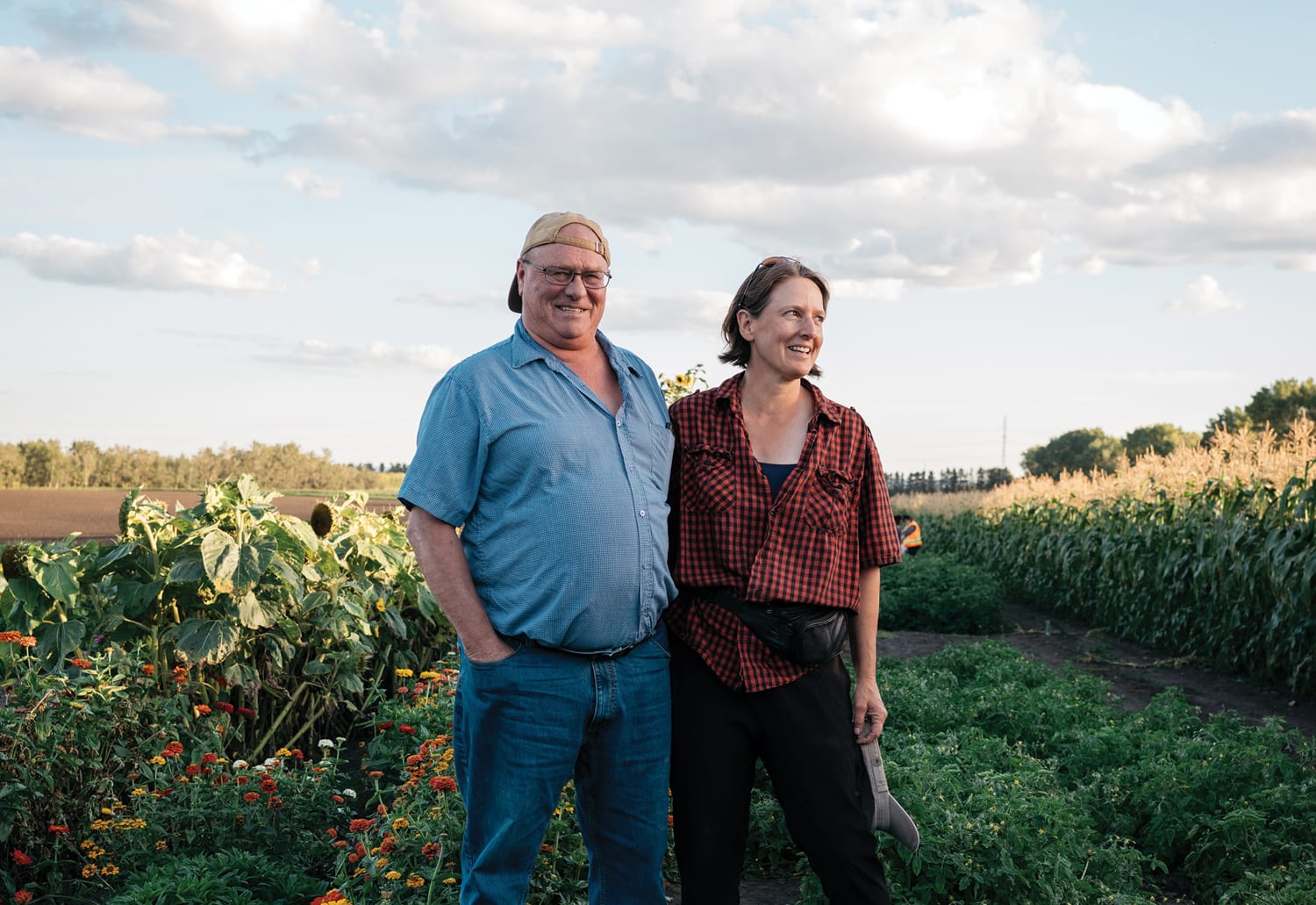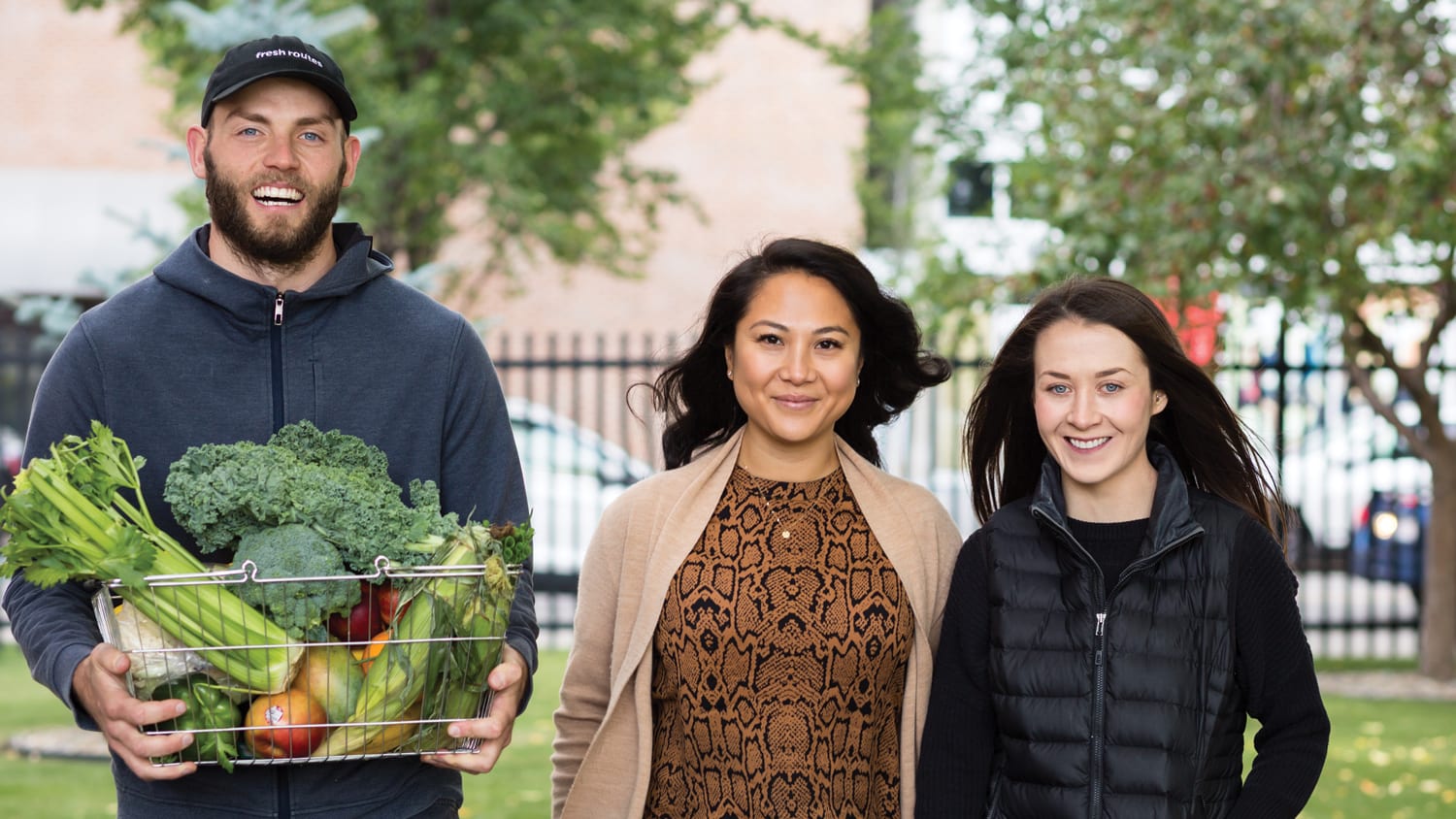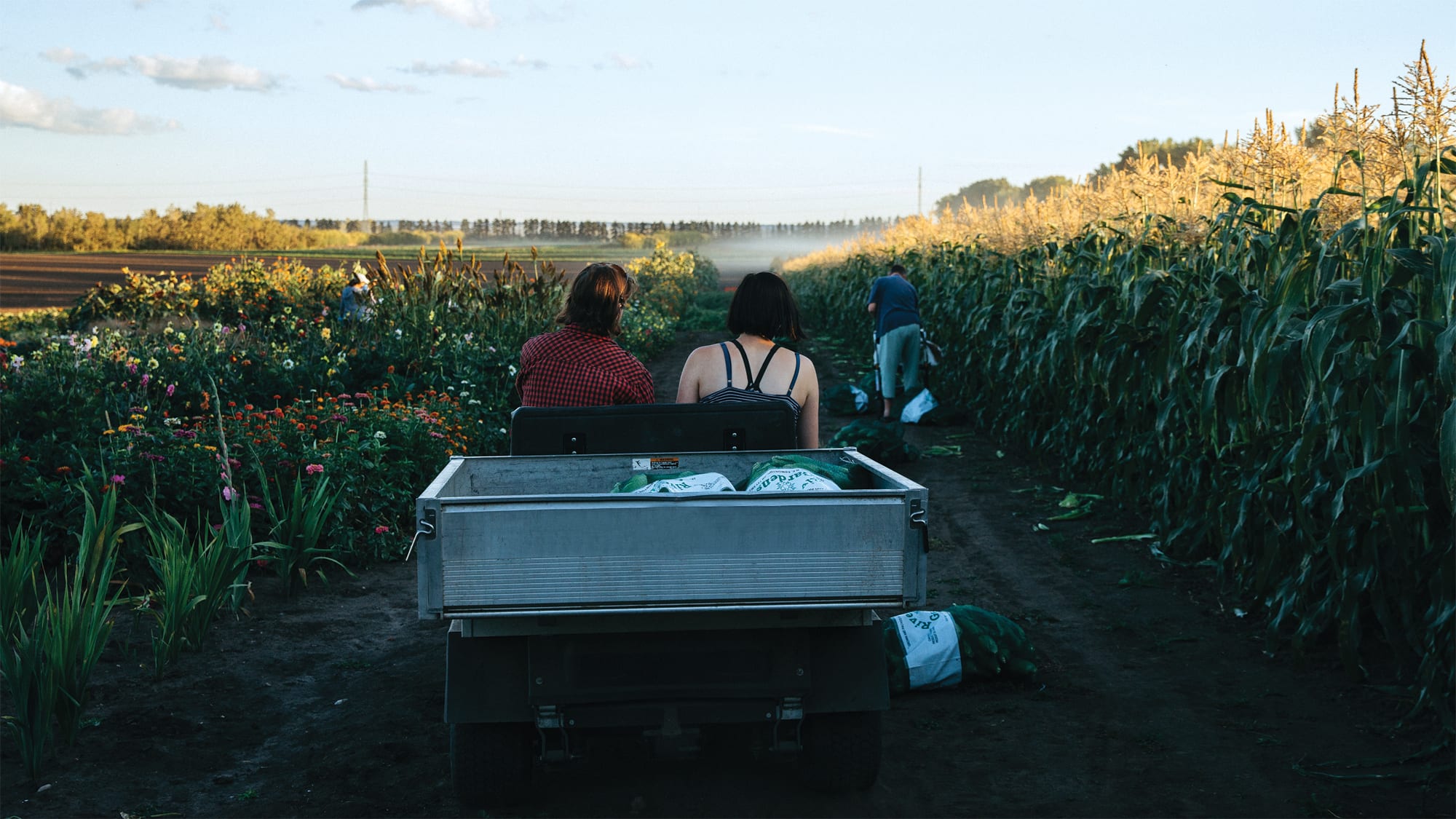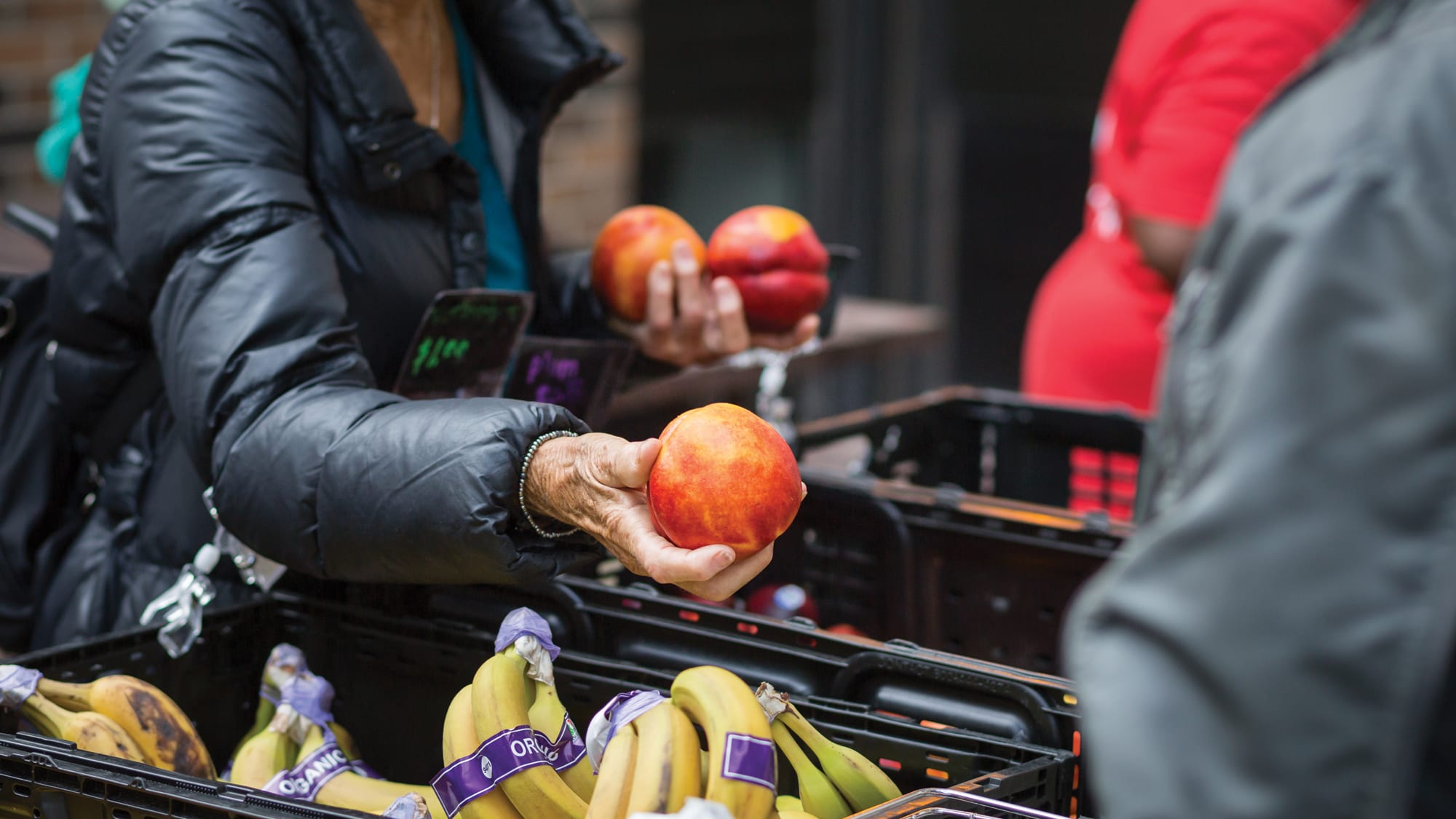There’s no denying it: Times are tough in our province. Which means more Albertans increasingly rely on food banks to put food on the table for their families.
Designed to provide emergency relief, 92 food banks currently operate in Alberta; collectively they are among the most widely used of any province in Canada. In March 2018, for example, Albertans made 97,497 visits to the facilities and 38 percent of users were children. Perhaps even more alarming, about 20 percent of Albertans accessing food banks in 2018 were employed—more than anywhere else in the country.
Food insecurity in Alberta isn’t an easy puzzle to solve. But there are innovative organizations across the province committed to eliminating barriers to food. Such groups support local food banks while also tackling bigger issues like our changing relationship with food. Their founders, employees and volunteers are among the dedicated Albertans working to strengthen our communities.
LADY FLOWER GARDENS
Kelly Mills met her partner Doug Visser, an AMA member and founder of Edmonton’s Riverbend Gardens, on an agricultural tour of Cuba in 2012. Their relationship would have far-reaching implications well beyond their two weeks spent studying Cuban permaculture. She had a vision; he had the farming skills and fertile land to grow her idea.
The result of their collaboration is Lady Flower Gardens, a two-hectare not-for-profit community garden. The facility empowers disadvantaged or disabled residents, new Canadians and other marginalized populations to give back, engage in experiential learning and feed their families. Located on rich, picturesque farmland near the North Saskatchewan River in Edmonton, the facility also has shared access to 30 hectares of old-growth forest.

Community organizations—such as the Edmonton Nature Club, Stan Daniels Healing Centre, Alberta Health Services and the Mustard Seed—schedule time for clients to volunteer at Lady Flower Gardens. During their visits, volunteers typically water, weed and harvest various vegetables, including potatoes, carrots and kale. Every year, they harvest more than 22,000 kilograms of fresh local vegetables for their own tables and to supply the Edmonton Food Bank.
As a long-time volunteer at Edmonton’s urban drop-in centres, Mills noticed the positive impact that hands-on tasks like arts and crafts had on the centres’ clients. At the same time, the self-professed city girl cherished her own time working with relatives on theirfarms and integrating into strongrural communities.
She traces a connection between her city and country experiences: “People in the city who are marginalized need community and good nutrition just like anyone else,” she says. “So we wanted to create a space where their contributions would be valued, and they’d have the support necessary to accomplish their tasks.”
MORE TO READ
Alberta social enterprises that are doing business right
Although the food bank is a major beneficiary of their work, the donations aren’t the primary goal of Lady Flower Gardens. “We don’t think of ourselves as a charity,” Mills explains. “We strive to be an authentic community where everyone contributes.” Lady Flower Gardens’ mission stands firmly in the realm of community building: forming a connection to the land and to one another, while supporting mental and nutritional wellbeing through access to gardens and forests.
Mills hopes to make Lady Flower Gardens a self-sustaining enterprise. People can contribute by donating online, signing up for a forest tour, or volunteering during harvest season. The pair is also planning other sustainable initiatives—like collecting traditional medicines from the forest and securing a conservation easement on the land to protect it for future generations.

LEFTOVERS & FRESH ROUTES
When AMA member Lourdes Juan saw a Calgary bakery earmark 100 kilos of bread as waste, she knew something was wrong. She wondered how some people struggle to put meals on the table while perfectly good food winds up in landfills?
That experience in 2012 inspired the entrepreneur to found the Leftovers Foundation, a not-for-profit whose mission is to eliminate food waste going to the landfill. She was determined to redirect wasted food from restaurants, stores and food vendors to service agencies that sorely need it. Today, Leftovers operates in Calgary and Edmonton with more than 800 volunteers.
The mountain of day-old bread that spurred Juan into action was merely a crumb in the grand scheme of things: An astounding $49 billion in food is wasted each year in Canada, amounting to 35.5 million tons—or 58 percent of the total food produced the country.
Given the shocking statistics, Leftovers also focuses on raising awareness about food waste. “If every single person made one small change to waste less food in their daily lives, the world would be very different,” Juan says.
Last year, Leftovers “rescued” more than 145,000 kilograms of food, thanks to donations from 70 partners, including Ace Bakery, Blush Lane Organic Market, Starbucks and the Calgary Stampede. Volunteers transport food from the vendors to one of 53 partners, including the Bissell Centre, Calgary Women’s Emergency Shelter and Calgary Food Bank. By providing a steady stream of fresh food, Leftovers helps these agencies free up their budget to spend on other services and programs.
To get involved, volunteers use the Leftovers app, available on the App Store and Google Play, to sign up for a route. It’s as easy as ordering an Uber. Everything the organization does is built to scale—to focus on partnerships and facilitate its long-term vision of expanding to other Canadian cities. With her background in urban planning, Juan is also working to raise awareness about waste-reduction policies that can be adopted at local, provincial and national levels.
MORE TO READ
How to grow herbs and small vegetables in your own kitchen
Earlier this year, Juan also worked with Leftovers colleagues Anna Johnson and environmental engineer Rob Ironside to found Fresh Routes, a mobile grocery store that provides affordable, nutritious food to Calgary’s “food deserts”—underserved areas with limited access to good-quality fresh food. The non-profit social enterprise sells produce and day-old bread at below-market prices.
Fresh Routes has grown so popular that Calgary operations have expanded to more than 60 monthly stops, serviced by a new truck and a decommissioned transit bus that’s been retrofitted as a fully accessible, barrier-free mobile grocery store. The project also expanded to Edmonton, with one truck and a handful of weekly stops.
Juan, Johnson and Ironside invite all members of the community to shop at Fresh Routes—something Johnson underscores as a cornerstone of the operation. “Dignity is a huge part of what we do,” she says. Ironside agrees: “Whether you’re homeless or a billionaire, we don’t need to know who you are when you shop with us.”
Because Fresh Routes is a social enterprise, shopping there is the best way to support those who need the service. By increasing sales, you can make existing stops more viable and help fund the expansion to new ones. View the schedule at freshroutes.ca to find a mobile market near you.

FILL OUR FLEET
How AMA members can help feed Albertans
AMA’s annual Fill Our Fleet campaign provides healthy meals to Albertans in need. As part of the yearlong giving campaign, AMA members come together to support 11 food banks across the province—via donations of funds and non-perishable food.
